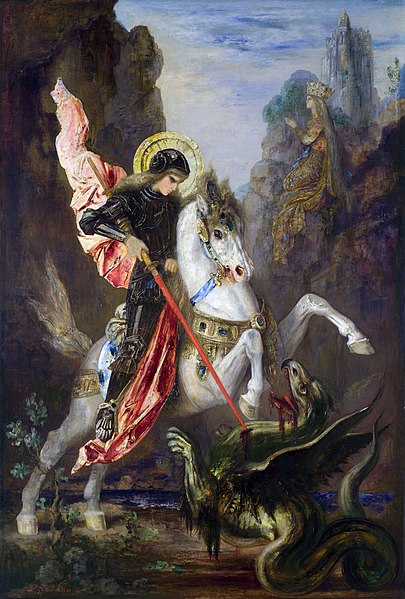What is a dragon?
 |
| Art by Anne Stokes http://www.annestokes.com/dragons/ |
Google Searches definition is "A mythical monster like a giant reptile. In European tradition the dragon is typically fire-breathing and tends to symbolize chaos or evil, whereas in East Asia it is usually a beneficent symbol of fertility, associated with water and the heavens"
This of course gives us what people most commonly think of as dragons, which are two very different types of beings. That is; 'European symbols of greed which breath fire,' and "Asian serpent deities of water and sky.' Such designations are problematic because they cause us to miss many other important types of dragons and aspects of folklore. For example, one of the oldest local Kagura (sacred dances) we know about, Susanoo, the kami of wind and the underworld is depicted as battling two fire breathing 'dragons.' While in Europe there were many dragons which were clearly water spirits, growing in wells, that didn't have the ability to breath fire. One of the most famous stories of a dragon kidnapping a princess involves such a 'dragon.' In other words both Asia and Europe had multiple things we would consider dragons.
Dragons than need to be defined not by region, but by what they did, what their relationship with the world was. However, since water dragons and flying fire breathers are so different from each other this still begs the question what is a dragon?
The only real similarity between all the creatures we call dragons are that they are magical reptiles. So is a dragon merely a magical reptile? If so, would the snakes which act as the house spirits in Japan and Lithuania be dragons? They are magical serpents. How about the Western Slavic ancestral spirits which turn into snakes and protect their decedents? They are also serpents.
The issue itself might be related to size, perhaps dragons are only supernaturally large serpents. The original word does mean something akin to giant serpent. So perhaps household serpents aren't dragons because they aren't big enough?
Being a fan of fantasy, however, I like the idea of small dragons.
Plus this also leads me to wonder about supernatural serpents which dwelt in the waters of Russia, Japan, and even the Ancient Americas and would crawl out of the rivers and lakes to mate with women? These serpents aren't overly large, but are very similar to the early conceptions of water kami in Japan, which would marry human men and women, but which had a serpent form (especially when they were angry). I hate to discount these spirits as they seem to fit with so many older traditions that may be forerunners to or at least related to many dragon myths. Although these serpents may not dragon like per say. Though, again, how can we tell?
 |
| St. George apparently slew dragons which were about the size of a lion, smaller than the horse he was riding. |
What about Hydra? Is Hydra a dragon? It's a large serpent. Yet don't feel like it's a dragon. Yet is it any more different from fire breathing winged serpents than water serpents?
The whole situation is likely impossible to rectify perfectly, since we have defined such divergent beings as dragons, yet at the same time we feel like we're certain we know what dragons are and more importantly what they aren't.
The only solution I can come up with for defining dragons is to use the Justice Potter Stewart definition for porn, which is, "I'll know it when I see it." I can't perfectly define dragons, and honestly, I haven't seen anyone who has done so, but I feel like I know what a dragon is when I read about them. More importantly, perhaps society determines what dragons are and aren't.
Please let me know your thoughts on this problem, and let me know if you think hydras are dragons, if basilisks are dragons, and other critters which are close to dragons, but may or may not be dragons.













1 comments:
For me, a defining characteristic for a dragon is the ability to fly, either solely with magic or with the aid of wings. Therfore, the hydra is certainly NOT a dragon. As far as size, although we generally tend to think of dragons as large, I do not think this to be a defining aspect. I also believe dragons are intellectual creatures, capable of reason and logic (athough it may not always agree with the reason and logic of man.)
Thus I submit that the definition for a dragon should be... an intellectual, flying, reptilian creature. Notice I also removed magical from this definition. I think a biological explination can acount for many of the dragons abilities. Some dragons are certainly magical, however, if a dragon did not posess any magical abilities, I would certainly not remove its status of being a dragon. There has been much speculation and hypothesis about possible biological explinations for what we once thought were "magical" such as the ability to breath fire.
Post a Comment